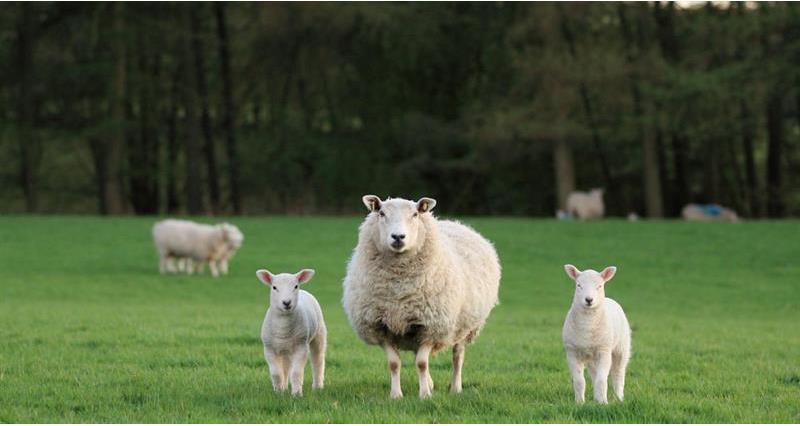Meet the farmers: Sioned Davies | Anna Hunt | Erin McNaught | Rebecca Wilson | Karl Franklin
8 things you didn’t know about British lamb
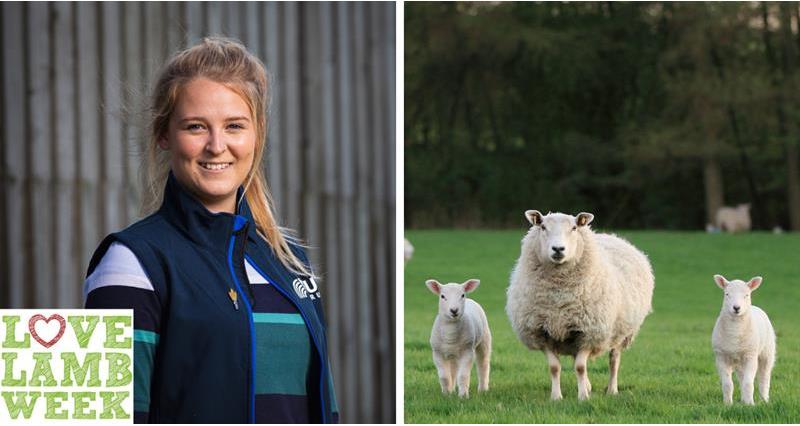 NFU Ambassador and young farmer Sioned Davies gives us 8 facts about British lamb that you may not have known, and a few reasons why you should be buying British lamb.
NFU Ambassador and young farmer Sioned Davies gives us 8 facts about British lamb that you may not have known, and a few reasons why you should be buying British lamb.
1. Nutrition
During these uncertain times, health is something a lot more of us are now taking more seriously. But it’s hard to sometimes search through the misinformation and slim tea diets for the correct information on what our bodies need. Well, one thing’s for sure, lamb should definitely be on your list of go-to health foods. It’s packed with protein, and is rich in Vitamin B12, essential for blood formation and brain function. Lamb is also packed with iron which is extremely important for adolescents as it helps with muscle development and growth, but many adolescents are not consuming enough iron which can impact cognitive ability and behaviour.
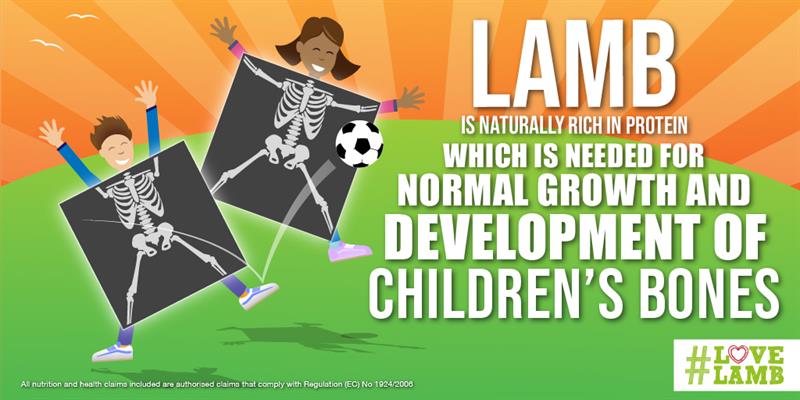
2. Environment
65% of UK farmland is best suited for growing grass, and sheep love to eat grass! It’s incredible really, these animals are able to utilise areas of the UK that farmers would never be able to use to grow fruit or veg and turn it into delicious and nutritious meat.
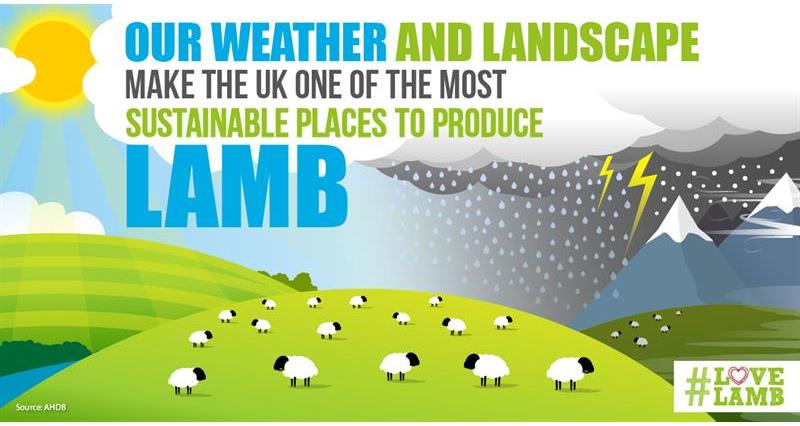
3. Low and slow (cooking)
So, what’s the best way to eat lamb? One tip: low and slow. Slow cooked lamb is one of the most delicious foods, and so easy! Stick a joint of lamb in the slow cooker either overnight or all day and you’re guaranteed a delicious meal.
4. Flavours
You’re probably familiar with some of the classic lamb flavours such as mint, rosemary and garlic. But how about pomegranate, apricots or honey to give a fresh and flavourful snap to your lamb meals.
5. How many sheep in UK
Did you know there are approximately 22.5 million sheep in the UK?!
6. Just meat?
Meat is the main product of sheep, but their wool, milk and skin can also be used, which makes them one of the most sustainable animals. Wool is an amazing product with so many uses and sheep need to be sheared to keep them fit and healthy. Many farmers this year have struggled to sell their wool so more needs to be done to demonstrate the versatility of British wool.
Sign the petition calling for British Wool products to be mandatory for insulating in the government’s new home insulation scheme and for insulation and carpeting in any public financed building projects.
7. Breeds
There are approximately 90 different sheep breeds and crosses in the UK with each one uniquely bred to thrive in certain environments. For example, a hill breed such as a Herwick has been bred to be hardy and able to live in difficult terrain and harsh weather conditions. Whereas a lowland breed such as a Texel has been bred to grow quickly. The badger face welsh mountain is believed to be one of the oldest British sheep breeds.
8. History
Sheep have been a common sight in the UK since Roman times with their wool, meat and milk forming an essential part of Medieval Trade.
5 reasons why British lamb is best
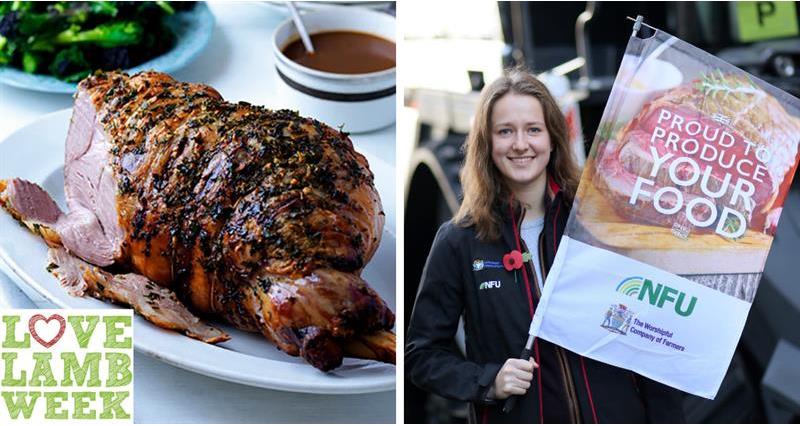 Lamb has a number of qualities it brings to the dinner table. So NFU Student and Young farmer Ambassador Anna has given us 5 reasons why we should all enjoy British lamb well beyond Love Lamb Week.
Lamb has a number of qualities it brings to the dinner table. So NFU Student and Young farmer Ambassador Anna has given us 5 reasons why we should all enjoy British lamb well beyond Love Lamb Week.
1. Tasty
The most important reason - British lamb is full of flavour! Many chefs have sworn by British lamb in the past and MasterChef’s John Torode is a great lover of this great product.
2. Good for the environment
Due to Britain’s climate and weather patterns, we have an excellent ability to grow grass and this goes hand in hand with rearing grass-fed livestock. Most lambs spend most of their life outside on pasture, which is not only extremely healthy for livestock, but also has benefits for our landscape. 70% of British sheep live on land that we cannot grow crops on, like mountain and hills. Livestock grazing helps to manage grass species and encourages wild flowers and species of insects to flourish.
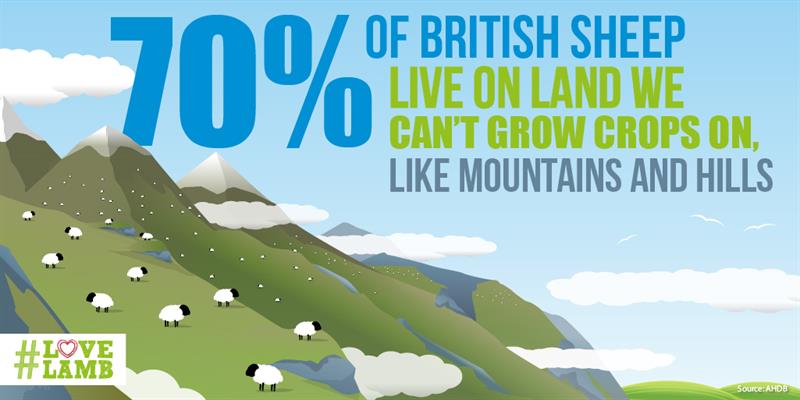
3. Health benefits
British lamb is very good for you; not only is it a source of high-quality protein, but it also a source of vitamins and minerals, including vitamin B12, zinc, potassium and iron. These are very important for muscle growth and repair, so lamb is a great recovery aid for athletes especially. Lamb also contains health-promoting omega 3 fatty acids.
4. High standards
British lamb is produced to some of the highest animal welfare standards in the world. Lamb which has the Red Tractor label on it is part of an assurance scheme which means that the product is fully traceable, safe and produced to high welfare standards. Each farm must undergo an annual inspection where farmers must, among other things, prove they have completed records for movements of animals and medicine records, as well as having their farm inspected physically.
5. Low food miles
British means British! And that means low food miles, and therefore less global greenhouse gas emissions from transportation. Agriculture is responsible for around 10% of global greenhouse gas emissions, whereas transportation is responsible for around 27%. Therefore, buying local food can help our planet!! If lamb is sold locally, why not buy it locally?
6 ways to show your support for British lamb
- Cook one of our delicious British lamb recipes. If you find one you like, make sure you share it on social media.
- Sign the petition calling for British Wool products to be mandatory for insulating in the government’s new home insulation scheme and for insulation and carpeting in any public financed building projects.
- Share your lamb pictures and videos on social media to inspire others.
- Use the hashtags #LoveLamb and #MakeitLamb in your posts.
- Download AHDB's infographics, containing health and environmental information to help spread the word.
- Sign up to our Back British Farming newsletter for recipe ideas and other ways you can show your support.
Erin McNaught explains why there are so many different breeds of sheep
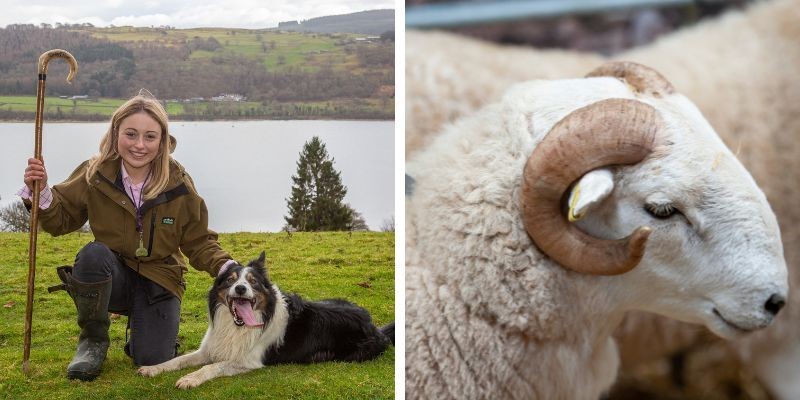
Meet Erin McNaught, a young farmer and award winning sheep dog handler from Snowdonia.
Did you know that there are over 90 different breeds of sheep in the UK? It is thought that we have the biggest variety than any other country in the world!
So why so many breeds? Each breed has different characteristics and is suitable for different landscape types.
On my family farm we keep two different breeds of sheep to suit two different types of land; Texel’s on the low land and Welsh Mountain sheep grazing above 1000ft on the mountain.
Texel sheep have a broad white face, long rectangular body and well pronounced muscles. The breed originated on the island of Texel on the northwest coast of Holland, and it was first imported into the UK in the 1970s. As an imported breed, it is most suited for low land and has become renowned for its ability to produce meat that meets retail specification with its pronounced muscling, a long loin and lean meat.
The Welsh Mountain sheep are smaller in size with a white and tanned face and head. It is a native breed here in Wales and therefore thrives in extreme environments, with strong survival instincts and excellent mothering ability. The meat is fattier than the Texel’s, which makes them less desirable to the modern butcher. However, they are an economical breed to keep as they will thrive with little intervention in the mountains and play an important role in the conservation of our adored landscape here in Wales.
Rebecca Wilson talks about the importance of animal welfare
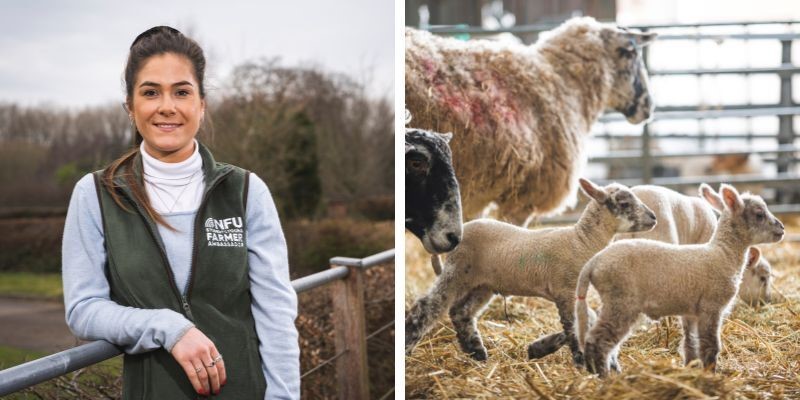
Meet Rebecca Wilson, a young farmer from Yorkshire.
From birth to market, British lambs experience the highest animal welfare standards with scrupulous checks at every stage of their life. As soon as a lamb is born, we ensure that they have been given everything they need to get the best start in life – from the vital colostrum to a specially formulated nutrient boost.
Whether lambs are kept indoors, outdoors or a mixture of the two, the main priority is the health of the individual animals and subsequently the health of the whole flock. As livestock farmers we ensure that animals will always have access to food, water and appropriate shelter. We work closely with our vet to manage flock health according to the seasons and administer treatment if required.
We are proud of our produce and care for our lambs, so the animal welfare journey does not end when livestock leaves our farm. Livestock markets are specially designed to be as stress-free and safe as possible for both animals and handlers, with formal inspections and frequent welfare visits a matter of course.
Love Lamb Week brings into focus the things we do on farm for animal welfare every week of the year.
Karl Franklin inspires us on cooking with lamb
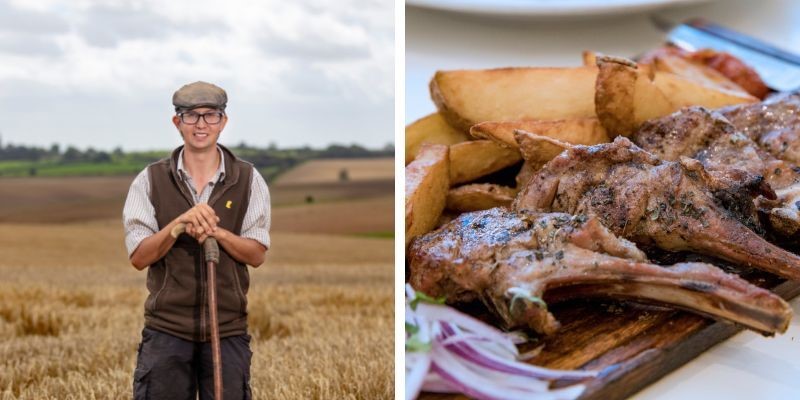
Meet Karl Franklin, a young farmer from Oxfordshire.
In my opinion, lamb is an awesome ingredient in any dish. Turning grass, something we as humans can't eat, into something delicious but also nutritious. It is packed full of vitamin B12, zinc, potassium and iron. There are many different cuts of lamb, for example a boned and rolled breast of lamb is delicious, slow cooked with a splash of honey and thyme. For a quicker midweek meal, pan fried lamb chops with crushed new potatoes and plenty of green veg is a great option!
You can use the whole lamb, so nothing goes to waste. Many farmers up and down the country are providing lamb boxes so you can have lamb locally sourced that is seasonal and sustainable! Look out for local options and get inspired cooking lamb.
